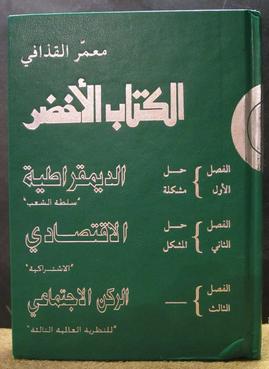The Green Book (Gaddafi) facts for kids

Cover of the Arabic version of The Green Book
|
|
| Author | Muammar Gaddafi |
|---|---|
| Original title | الكتاب الأخضر |
| Country | Libya |
| Language | Arabic |
| Subject | Political philosophy |
| Publisher | People’s Establishment for Publication, Distribution, and Advertising |
|
Publication date
|
1975 |
|
Published in English
|
1976 |
| Media type | |
| Pages | 110 |
| ISBN | 978-1-54124-131-2 |
The Green Book (Arabic: الكتاب الأخضر al-Kitāb al-Aḫḍar) is a short book written by Muammar Gaddafi, who was the leader of Libya. It was first published in 1975. The book shares Gaddafi's ideas about how a country should be run, which is called his political philosophy.
Some people say The Green Book was inspired by The Little Red Book, which contained sayings from Mao Zedong, a leader from China. Both books were easy to read and had many memorable phrases. The Green Book was shared widely both inside and outside Libya. An English version was released in 1976. During the 2011 Libyan Civil War, some people who were against Gaddafi burned copies of the book.
Contents
How The Green Book Influenced People
Impact in Libya
In Libya, children spent about two hours each week studying The Green Book in school. Parts of the book were also broadcast daily on TV and radio. You could also see its slogans on billboards and painted on buildings across the country.
Influence Around the World
By 1993, discussions and lessons about The Green Book were held at universities and colleges in countries like France, Eastern Europe, Colombia, and Venezuela.
In 2008, Evo Morales, who was the President of Bolivia, visited Libya. He said that The Green Book greatly influenced his own political ideas and policies.
What's Inside The Green Book?
The Green Book has 110 pages and is divided into three main parts:
- The first part, published in 1975, talks about how to solve the problem of democracy. It suggests that the people should have direct power.
- The second part, from 1977, discusses economic problems and suggests a type of socialism.
- The third part, published in 1981, looks at the social foundations of Gaddafi's ideas.
Gaddafi's Main Ideas
The Green Book does not support either capitalism (where private businesses own most things) or communism (where the government owns everything). It also rejects representative democracy, where people vote for others to make decisions for them.
Instead, the book suggests a type of direct democracy. This means all adult citizens would take part directly in making political decisions. This system would be managed by the General People's Committee.
The book also states that everyone has a natural right to express themselves freely. It suggests that things like book publishers, newspapers, TV, and radio stations should be owned by the public. Gaddafi believed that if these were privately owned, it would not be democratic.
Gaddafi also wrote about a future society where money and profit would disappear. He imagined a society where everyone's needs are met, and there would be no need for money or profit.
Key Ideas from the Book
The Green Book explores many ideas about how society and government should work. Here are some of its main points:
- Government and Democracy: Gaddafi believed that traditional governments, like those with parliaments or political parties, take power away from the people. He suggested that people should govern themselves directly through "Popular Conferences" and "People's Committees."
- Laws: The book argues that laws should come from a society's customs and religion, not from written constitutions that can change often.
- Economy: Gaddafi thought that people who work should not just earn wages. Instead, they should be partners in the businesses they work for and share in the profits. He also believed that basic needs like housing, transportation, and land should be available to everyone, not owned by a few who can then charge others.
- Society and Family: The book discusses how families, tribes, and nations are natural parts of human society. It emphasizes the importance of nationalism for keeping a country strong.
- Women: The Green Book states that women and men are equal as human beings. However, it also suggests that men and women have different natural roles. It says that women should be free to raise families without being forced into jobs that are more suitable for men.
- Education: Gaddafi believed that formal school education can be too strict. He suggested that people should be able to learn in whatever way they choose.
- Sports and Arts: The book encourages people to participate directly in sports and arts, rather than just watching others perform.
See also
 In Spanish: Libro verde (Gadafi) para niños
In Spanish: Libro verde (Gadafi) para niños
- Arab socialism
- Islamic socialism
- Jamahiriya
- Quotations from Chairman Mao Tse-tung
- Ruhnama
- Secular religion

